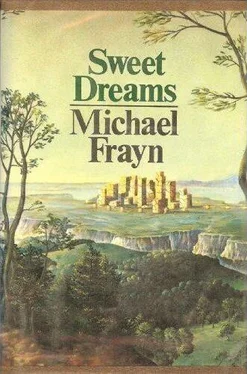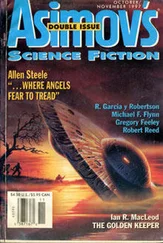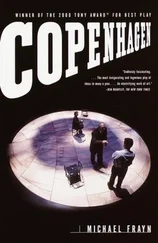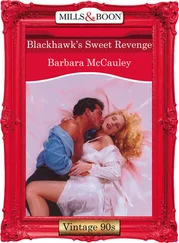“But seriously,” cries Howard to Michael in a dramatic voice, over the coffee and brandy, waving his cigar about, “what are we going to do about these people? How can we solve the problem?”
The girls both stare at him, obviously impressed by the scale and force of his concern. They are all a little drunk.
“Keep killing them,” says Michael humorously, resting a hand on each girl’s forearm. “Wheel on the cholera. The more we keep them down, the less of them there’ll be to get themselves into trouble.”
“Oh, charming,” says one of the girls.
“Have another chocolate, love,” Michael invites her, smilingly holding out the dish. “Get a little more refined sugar into your arteries.”
Howard’s report on the human condition, when it finally appears, is a remarkably balanced and perceptive document. He resolutely refuses to give way to the temptation to blame the local inhabitants for their problems. He points out that many of the characteristics of man which outsiders find distasteful reflect genuine local needs and aspirations.
He recognizes that there is a real divergence of expert opinion between those who believe that men are happy because they are miserable, and those who believe that men are miserable because they are happy; and wisely arrives at a synthesis of both views.
He cautions against any hasty attempts at imposing reform from outside, warning that they would be very likely to upset the delicate social and economic balance which society has achieved — to cause unemployment among the medical profession, for instance, and to weaken the funeral as one of the main bonds of family life.
He recommends improving the quality of life by gradually weaning people away from unhealthy indoor forms of death, such as heart disease, and offering more facilities for dying traditional outward-looking deaths in the fresh air. To this end he urges the setting up of carefully landscaped mountains and waterless deserts in the main centres of population, and their stocking with carnivorous animals and poisonous reptiles.
The first two printings of the report sell out before publication, and there is fierce competition for the paperback rights. The reviews are marvellous, and Howard gets a call from Bill Mishkin, of Bill Mishkin Productions.
“Howard Baker,” says Bill Mishkin, “I want to make this thing. It’s as simple as that.”
Bill Mishkin has an office on the fifty-fourth floor of the RCA building. The hills outside the city are remote and blue behind his head as he leans back in his chair, shirt sleeves rolled up, collar and tie loosened. He is younger than Howard expected, with crisp curly hair, full smooth cheeks which are just about to smile at his own jokes, but never quite do, and thick horn-rimmed spectacles through which his magnified eyes watch carefully to estimate audience reaction. The office is littered with scripts.
“Howard,” he says, “I think this is far and away the subtlest, most exciting … zaniest … most realizable, wittiest, sexiest… most lovable White Paper that I have ever set eyes on.”
“Well …,” says Howard politely.
“I love McKechnie. You know who McKechnie reminds me of? Raskolnikov. Only McKechnie’s more subtle. I love the idea of lions and tigers in the middle of London. Like we’re in Bond Street. Suddenly … rrrrrrr! And there’s a man-eating tiger bounding out of the Westbury Hotel! You have a very visual imagination, do you know that, Howard?”
“Well …,” objects Howard modestly.
“No, you really do. And the mangrove swamps? There’s this guy walking down Piccadilly, when suddenly — woomph! He’s gone! Help! — schloomp, schloomp, schloomp — he’s fallen into a mangrove swamp! Howard, you and I share the same sense of humour.”
“Well …,” says Howard tactfully.
“We’re really going to have a ball together on this one. Because the thing is this, Howard. I want you to write the script.”
“Well …,” agrees Howard cautiously.
“Because you’re the only one who can do it, Howard. You understand these people. And it’s practically a script already. Because I don’t want to change anything . I want to realize exactly what you have envisioned.”
“Well …,” says Howard gratefully.
“Did you by any chance get to see New Canaan, Connecticut, between March 1 and April 14 last year? No? Because that was mine. I made that. That would have given you some idea of the way I work. I also did one or two of those hijackings over Nevada — but that wouldn’t have interested you. That was a different style of production altogether.
“I wish you’d seen New Canaan, Connecticut, March 1 to April 14…. Excuse me one minute. Stella, before Howard leaves, will you fix for him to fly to New Canaan for a few days last spring …?”
“Well …,” considers Howard.
“Because I know you’ll appreciate that. No violence. No unnecessary screwing. Just a lot of real people doing real things. A black family moves in — the neighbors bake them a cake. This young guy has an automobile accident — they take him to the hospital — his wife breaks down and cries. That kind of thing. There are some really wacky scenes at the PTA meeting that you’d love. And the colour’s just fantastic….”
“Well …,” objects Howard.
“But this report of yours, Howard. Two years ago we couldn’t have made this. The industry wasn’t mature enough. But now the message is getting through. This is the kind of thing that people want to see. They’re sick of big war spectaculars. They want a little idealism, a little love. The bankers realize they’ve bombed with the blockbusters. They’re ready to back our judgment now, Howard — my judgment, your judgment.”
“Well …,” accepts Howard graciously.
“This is a go project, Howard. Together we’ll build Jerusalem in England’s green and pleasant land.”
“For the option,” Howard explains to Felicity, walking up and down the terrace, frowning seriously, with the setting sun flashing in a thousand windows of the city behind him, “they’re paying … 30,000.00.
“They pay that anyway, whatever happens. Then, if we go ahead with the script, they pay, for the treatment … 50,000.00, then for the first draft … 120,000.00, and for the second draft another … 120,000.00, making in all, for the script … 290,000.00. Then if we actually go ahead and build the New Jerusalem, they have to take up the full rights, which would amount to … 2,000,000,000.00.“
Felicity gazes at him, trying to take it in. “2,000,000,000.00?” she repeats.
“That’s right,” says Howard casually … “2,000,000,000.00.”
“I suppose it’s all right,” says Felicity, “if you say it quickly … 2,000,000,000.00”
“Oh,” says Howard … “2,000,000,000.00 isn’t all that much, as these things go. After all … 2,000,000,000.00 when you think about it, is … 0.00 compared to the budget for the whole production, which will probably run out about … 100,000,000,000,000,000,000,000,000,000.00.”
Bill Mishkin flies out to Rome. Bill Saltman, the director, flies in from Miami. He calls Howard as soon as he arrives — but Howard has flown out to the Bahamas, for a conference with Bill Mishkin, who is stopping over on his way to Caracas. But it turns out that Bill Mishkin has had to change his plans, and go to New York instead to get a haircut. So Howard flies out from the Bahamas just as Bill Saltman flies in.
Eventually Howard and Bill Saltman meet back home, two blocks away from the RCA building; but in Howard’s case with a great sense of velocity from his journeyings.
Bill Saltman has rented a large apartment with no windows, Second Empire furnishings, and gunsmiths’ production drawings of antique firearms arranged in tasteful clusters on the walls. He is a melancholy man, much older than Mishkin, with pouched drooping eyes that have seen civilizations fall and currencies collapse. He sits in a Second Empire armchair, a curling pipe in one side of his mouth, the other side opening and closing every few moments, like a fish breaking the surface, to let the smoke out, and listens expressionlessly while Howard explains his ideas for the script. Howard moves about the room, sitting on various chairs, gesturing.
Читать дальше












